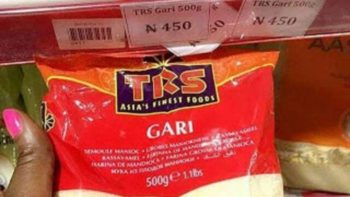A member of the Osun House of Assembly, Olatunbosun Oyintiloye, has condemned the alleged importation of garri from India into Nigeria.
Oyintiloye, in an interview with journalists in Osogbo, the Osun state capital on Thursday, said the situation was ‘unacceptable’.
According to him, if the garri importation is allowed to continue unchecked, it will cause further damage to the economy.
He added that it would permanently destroy the development of the value chain in the agriculture sub-sector and cassava production in the country.
The lawmaker said it was worrisome how such staple food commodity in which Nigeria has comparative advantage could penetrate the nation’s border.
Oyintiloye urged the security agencies in the nation’s borders to be on top of their game.
The legislator, representing APC-Obokun constituency, said such development should not be tolerated at a time the nation was striving to get out of recession and strengthen her naira.
“Majority of the small-scale farmers, marketers depend on the cultivation, production and sales of gari in the local market to survive.
“The importation of garri into Nigeria is absurd and not acceptable.
“We must protect the economy especially, staple foods that we produce in this country,” he said.
Oyintiloye called on all stakeholders to speak with one voice against reckless importation of goods to the country.
The lawmaker, who is the House Committee Chairman on Information and Strategy, challenged farmers, who are into production of garri and such other staple food commodities, to buckle up and repackage their product to make it more acceptable.
Meanwhile, the Federal Ministry of Agriculture and Rural development said it would liaise with the National Agency for Food and Drug Administration and Control (NAFDAC) to investigate the alleged importation of garri from India.
NAFDAC had denied certifying the product.
Copyright Ships & Ports Ltd. Permission to use quotations from this article is granted subject to appropriate credit given to www.shipsandports.com.ng as the source.
